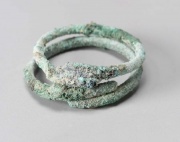Bronze disease
Revision as of 12:16, 27 April 2013 by (username removed)
Description
A destructive corrosion process that occurs on copper and bronze objects. Bronze disease occurs from the reaction of chlorides on copper in the presence of moisture and oxygen. It produces blue-green powdery spots usually containing atacamite (copper oxychloride). Once initiated, the reaction is cyclic making it difficult to halt, unless the reacting compounds (chloride, water, oxygen) are eliminated.
Synonyms and Related Terms
peste du bronze (Fr.); Bronzekrankheit (Deut.); bronspest (Ned.); cancro do bronze (Port.); wild patina; Mehlpatina; flour patina; malignant patina; rogna; caries
Additional Images
Authority
- Ralph Mayer, Ralph Mayer, A Dictionary of Art Terms and Techniques, Harper and Row Publishers, New York, 1969 (also 1945 printing)
- Caring for your Collections, Arthur W Schulz (ed.), Harry N. Abrams, Inc. , New York, 1992
- George Savage, George Savage, Art and Antique Restorer's Handbook, Rockliff Publishing Corp, London, 1954
- Dictionary of Building Preservation, Ward Bucher, ed., John Wiley & Sons, Inc., New York City, 1996
- External source or communication, External source or communication Comment: H. Otto, "X-ray fine structure investigation of patina samples" Freiberger Forschungshefte.B, 37, 1959, pp. 66-77.


